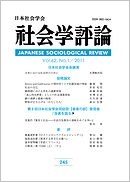巻号一覧

43 巻 (1992 - 1993)
- 4 号 p. 376-
- 3 号 p. 266-
- 2 号 p. 126-
- 1 号 p. 2-
43 巻, 1 号
選択された号の論文の10件中1~10を表示しています
- |<
- <
- 1
- >
- >|
-
生活史から見た『宗教社会学論集』勝又 正直1992 年43 巻1 号 p. 2-15,123
発行日: 1992/06/30
公開日: 2009/09/16
ジャーナル フリーIn Gesammelte Aufsátze zur Religionssoziologie of Max Weber two unique theses are found : (1) Protestants' solicitude caused by the predestination, (2) the auditory prophecy of ancient Judaism. Through reexamining Weber's biography, this paper discusses (1) what enabled Weber to understand Protestants' mind ? (2) why the voice of God predominates over visual images in his interpretation ?
Our review of his works from his personal life-history implies (1) the obsessed efforts as an heir of the Webers helped him understand the protestants' mind towards Beruf, (2) his identification with the ancient prophets made him discover an Occidental way of subjectivity called by the superior Subject.
Sublimating his personal problems in his life-history to academic works, Weber could describe [1] the end and [2] the origin of the genealogy of the Occidental subjectivity in the two theses.抄録全体を表示PDF形式でダウンロード (1528K) -
制度化の規約松本 三和夫1992 年43 巻1 号 p. 30-43,123
発行日: 1992/06/30
公開日: 2009/09/16
ジャーナル フリー科学者、科学者の行動、科学者のネットワーク、科学者集団、科学制度、社会システムのすくなくとも六つの活動水準を分析の単位として、どのような型の首尾一貫した科学社会学の理論が構成できるかを吟味し、理論の帰結を科学者集団の制度化論に関連づけて特定する。
一九八〇年代以降、科学社会学は問題ごと、研究センターごとに研究スタイルの細分化が進むいっぽう、分野全体を基礎づける概念や理論にかならずしもじゅうぶんな見通しが得られていない。こうした状況に鑑み、本稿ではまず科学社会学の基礎概念を決め、研究前線における多様な研究動向間の橋渡しが可能なよう、科学社会学の外延を確定する。ついで、科学社会学の課題の内包を内部構造論、制度化論、相互作用論に分節して特定し、科学者集団の状態記述に関するかぎり、各課題が相互に共約可能であることを証明する。
最後に、制度化論を見本例として理論の含意を例示する。とりわけ、制度化がじっさいにどのような起こり方をするかのパターンに関する規約 (制度化の規約) を理論に導入すべきことを提唱する。それを用いて理論を展開し、事実分析にとって有意味な、しかし直観だけではみえにくい逆説的な帰結 (専門職業化が制度化を伴わぬ事例 [ナチズム科学] の存在) が導けることを示したい。抄録全体を表示PDF形式でダウンロード (1725K) -
住岡 英毅1992 年43 巻1 号 p. 44-57,122
発行日: 1992/06/30
公開日: 2009/09/16
ジャーナル フリー本稿は、プルードン社会学の中心概念の一つである「真実の社会société réelle」を教育論の視点から分析することにより、それが著しく教育的社会性を帯びた概念であることを明らかにする。
教育的社会は、統制的で保守的、自発的で革新的といった、対立する二つの側面を併せもっている。「真実の社会」は、このうち後者の側面を内包することによって、著しく教育的社会性を帯びる。それは、微視的と巨視的の二つの側面から見て取ることができる。すなわち、微視的にみた場合、この概念の基盤を成す「相互性の原理」と「多元的組織の原理」は、「個と集団との調和」および「個人の自己実現の社会的展開」を目指す点で、教育的社会の自発的側面を内に含むものである。巨視的には、そのような「真実の社会」の拡大・深化による、国家の過剰な政治原理の超克、つまり、プルードンの言う「下からの革命」が、人間の変革による体制の漸進的・創造的な革新といった、教育的社会の革新的側面にそのまま通じる。
こうして、プルードンの社会学および社会主義思想は、教育的社会の性格を内包することによって、これまでの社会主義が抱えてきた過剰な政治主義の矛盾を、新たな地平から越えうる現代性を帯びている。抄録全体を表示PDF形式でダウンロード (1788K) -
西阪 仰1992 年43 巻1 号 p. 58-73,122
発行日: 1992/06/30
公開日: 2009/09/16
ジャーナル フリーおよそ社会的場面は身体の集合としてある。ある一定の形式のもとに配列された身体の集合は、どうじにその各身体にとって有意味ななにものかとして経験される。ここにある種の捻れがあるのは、みやすい。つまり、身体たちが自分たちの集合を有意味なものとして経験できるのは、身体が一定の形式のもとに集められているからであり、身体の集合が一定の形式のもとにあるのは、身体たち自身が、自分たちの集合を有意味なものとして経験しているからである。本稿は、身体 (=その社会的場面への参与者) たちが、この捻れを承知し利用しつつその場面を組織していく様子にたいして、ビデオ分析により積極的な記述をあたえていこうとするものである。ゴッフマンやケンドンなどの議論を参照し、その不十分な点を指摘しながら、エスノメソドロジカルに方向づけられた「会話分析」の手法に拠って、身体の配置の構造をあきらかにする。抄録全体を表示PDF形式でダウンロード (1739K) -
1992 年43 巻1 号 p. 73
発行日: 1992年
公開日: 2009/09/16
ジャーナル フリーPDF形式でダウンロード (56K) -
高橋 明善1992 年43 巻1 号 p. 74-75
発行日: 1992/06/30
公開日: 2009/09/16
ジャーナル フリー本書は公権力の支配から社会関係を理解するという視点にたつ社会史研究によって、社会学における日本の村落や日本社会研究に基礎的なストックとなる家・同族・村落についての新しい実証的理論を提起している。従来の家・同族理論に対する疑問にたって、同族を構成する家の始原的性格が近世初期資料まで遡及して検討される。そこからの実証と立論に本書の最大のメリットがあるといえる。
従来の家・同族・村研究と異なる多くの問題提起的な理論提示が行なわれる。その主要な論点について紹介しよう。抄録全体を表示PDF形式でダウンロード (209K) -
脱家父長制の理論を目ざして望月 嵩1992 年43 巻1 号 p. 76-77
発行日: 1992/06/30
公開日: 2009/09/16
ジャーナル フリーPDF形式でダウンロード (189K) -
進藤 雄三1992 年43 巻1 号 p. 77-79
発行日: 1992/06/30
公開日: 2009/09/16
ジャーナル フリーPDF形式でダウンロード (271K) -
竹内 洋1992 年43 巻1 号 p. 79-81
発行日: 1992/06/30
公開日: 2009/09/16
ジャーナル フリーPDF形式でダウンロード (321K) -
山田 富秋1992 年43 巻1 号 p. 81-83
発行日: 1992/06/30
公開日: 2009/09/16
ジャーナル フリーPDF形式でダウンロード (271K)
- |<
- <
- 1
- >
- >|